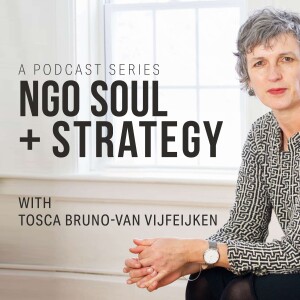
060. Should climate activists pivot their campaigning strategies from agitation to broadening public support? Aseem Prakash
 2023-07-21
2023-07-21
Summary
Environmental activism, environmental justice and equity concerns: what, if anything, is challenging about holding all of these three concerns at the same time?
Can a better integration or balance be achieved between these 3 concerns?
To what extent is radical activism cyclical in nature because it is hard to keep activists motivated for peak public mobilization moments?
In this NGO Soul+Strategy podcast episode, I interview Aseem Prakash, Professor of Political Science and Founding Director at the Center on Environmental Politics at the University of Washington, Seattle (USA) on climate change activism by nonprofits and social movements. Aseem does much of his research together with Nives Dolsak, also a Professor at the University of Washington.
Aseem’s Bio:
- Professor of Political Science; Walker Family Professor; Director, Center for Environmental Politics at the University of Washington, Seattle
- Former Assistant Professor in Strategic Management and Public Policy at the George Washington University in Washington DC
- Obtained his Ph.D. at the Dept of Political Science and the School of Public and Environmental Affairs at Indiana University
- MBA from the Indian Institute of Management in Ahmedabad, India
Nives’ Bio:
- Nives Dolsak is Professor in Sustainability Science and Director of the School of Marine & Environmental Affairs at the University of Washington, Seattle, USA
- Visiting professor at the University of Ljubljana, Slovenia
We discuss:
- Is environmental activism still guilty of white elitism? To what extent is a concern for environmental degradation, including climate change, still primarily a concern for citizens only once their material needs are met? Is the focus on environmental justice making a difference in this regard?
- There are few climate deniers anymore – even in the US: it is more a conflict over what instruments or ways of fighting climate change to use, not a conflict anymore over the goals themselves. Who carries most of the burden of energy policy implications coming out of climate change mitigation needs? Who loses and who wins across rural/urban areas, class, and race? Who pays for the costs of mitigation, and who gets the benefits? These are equity concerns
- Climate change contention and the surge of populism across the world are closely linked since class and location or place (rural vs. urban concerns) are intertwined
- What are the merits of outsider strategies – a la Extinction Rebellion and Sunrise Movement vis-a-vis insider strategies (Environmental Defense Fund, Greenpeace (partially) etc.?
- ‘Radical’, disruptive activism can have several benefits while it can also antagonize or turn away broader publics (see the radical flank argument)
- Museum vandalism to draw attention to the climate crisis is primarily a European tactic and surged in 2022; it seems to have died down so far in 2023.
Resources:
Aseem’s Website
Aseem’s LinkedIn Profile
Academic article on climate change activism motivated museum vandalism (open access!): https://www.nature.com/articles/s44168-023-00054-5
Example of a article by Aseem and Nivek for broader audiences: HERE
Their article on South Africa and coal:
More Episodes
Create your
podcast in
minutes
- Full-featured podcast site
- Unlimited storage and bandwidth
- Comprehensive podcast stats
- Distribute to Apple Podcasts, Spotify, and more
- Make money with your podcast
It is Free
- Privacy Policy
- Cookie Policy
- Terms of Use
- Consent Preferences
- Copyright © 2015-2024 Podbean.com





